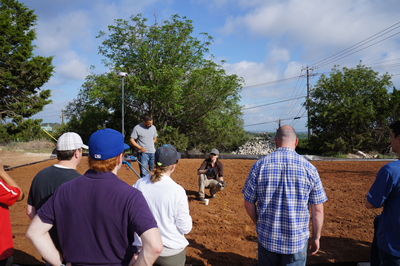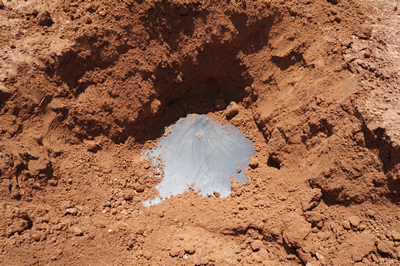
The discipline of liner integrity surveys and assessments (LISA) has changed quickly and has had a dramatic impact internationally on the quality of waste and water-related geosynthetic containment systems. The equipment that enables bare or covered geomembranes to be geo-electrically surveyed has advanced considerably in only a handful of years. Liner defects as small as pin holes can be found on multi-acre installations, and LISA is now a thriving—albeit still under-represented—CQA business within geosynthetics.
TRI Environmental, Inc. has been teaching LISA technology to engineers, contractors, installers, regulators and others for 10 years. The company’s Austin, Texas campus has the only dedicated facility in the world for liner integrity survey and assessment training.
NEXT TRAINING SESSION
- 21 October 2013 – LISA Classroom Training
- 22 October 2013 – LISA Field Training
- 22 October 2013 – LISA Level 2 Certification Exam (2:45 pm CDT)
Location: TRI Environmental, Bldg. A Facility, 9063 Bee Cave Road, Austin, TX 78733, USA
DOWNLOAD the Class/Registration Brochure (PDF)
A GROWING INDUSTRY

Only a small percentage of geomembrane installations are surveyed right now, but this is in part because not enough companies have known how to offer the service properly. The market has been underserved. But waste management companies are increasingly using liner integrity surveys, major geomembrane manufacturers such as GSE Environmental have engineered conductive liners that make surveys even more effective, and greater regulatory support for the utilization of LISA technology is emerging. LISA has improved the environmental performance of liner systems, mitigated the threat of excessive action leakage rates (ALR), and enhanced efficiencies for sectors such as mining and industrial processing. LISA technology has been used on large open installations (e.g., landfills, reservoirs) and on smaller tank liners and aquaculture raceways.
Some regulatory authorities have even decreased the need to destructively seam test a liner installation when a standardized liner integrity survey is performed.
TRI’s training provides guidance for bare geomembrane surveys (using methods such as the new arc tester or traditional water puddle or lance) and covered geomembrane (dipole method for soil or water covered). Multiple on-site test cells at TRI’s Austin, Texas campus allow these different conditions to be simulated, and attendees learn how to handle, calibrate and operate the equipment through a combination of classroom and field training. Expert instruction for the October training will be provided by Abigail Beck (TRI Environmental), Jeffrey Blum (Weaver Boos Consultants), and Sam Allen (TRI Environmental).
RESOURCE: Liner Integrity Survey General Guide (July 2013)
HIGHLIGHTS IN AUSTIN
- Rebuilt test pads for the hands-on field training portion of the event
- New arc testing equipment
- A larger soil-covered test pad
- New 2000 series equipment with a double-dipole arrangement that produces multi-directional 3D voltage mapping
- Separate cells for the water lance and water puddle training
- New equipment for the water dipole survey
- Equipment available for purchase or project-specific rental
For more specific information, contact Abigail Beck, TRI Environmental Director of Liner Integrity Services, abeck@tri-env.com, +1 512 623 0511. See also, www.linersurvey.com.
TRI Environmental is an international educational and service provider for liner integrity and leak location surveys. TRI performs liner integrity surveys, provides liner integrity survey equipment, refers liner integrity companies world-wide, and provides technician training and certification.











